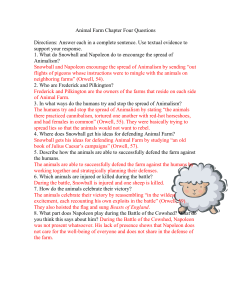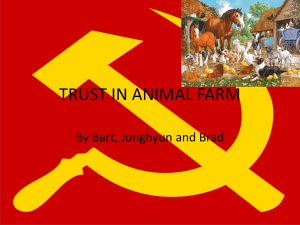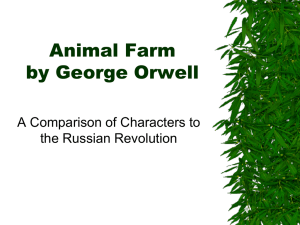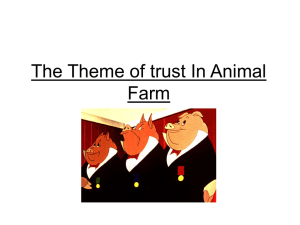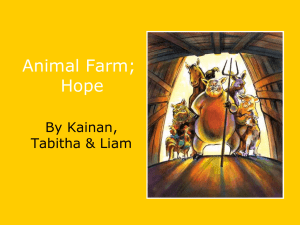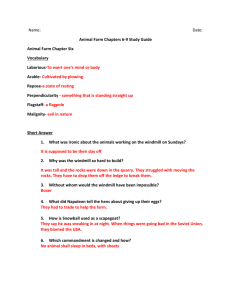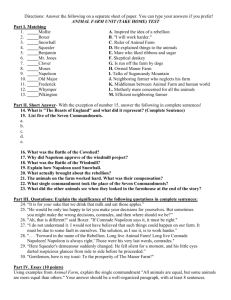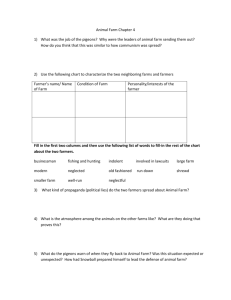Jeff Fargo`s great Animal Farm essay - It`s
advertisement
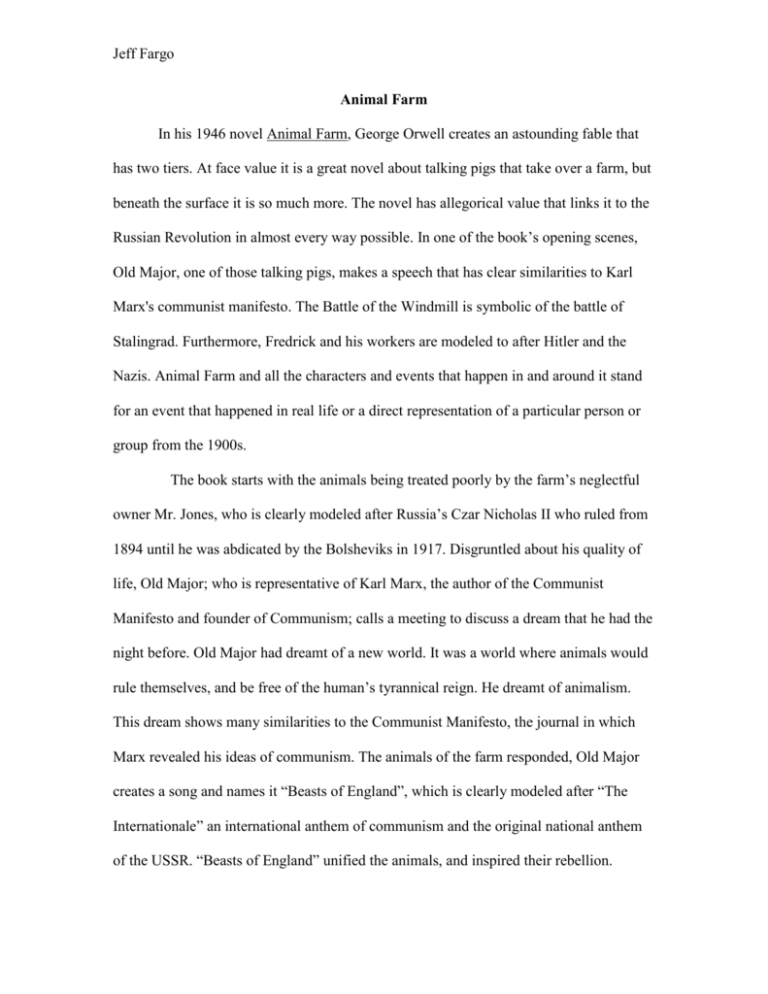
Jeff Fargo Animal Farm In his 1946 novel Animal Farm, George Orwell creates an astounding fable that has two tiers. At face value it is a great novel about talking pigs that take over a farm, but beneath the surface it is so much more. The novel has allegorical value that links it to the Russian Revolution in almost every way possible. In one of the book’s opening scenes, Old Major, one of those talking pigs, makes a speech that has clear similarities to Karl Marx's communist manifesto. The Battle of the Windmill is symbolic of the battle of Stalingrad. Furthermore, Fredrick and his workers are modeled to after Hitler and the Nazis. Animal Farm and all the characters and events that happen in and around it stand for an event that happened in real life or a direct representation of a particular person or group from the 1900s. The book starts with the animals being treated poorly by the farm’s neglectful owner Mr. Jones, who is clearly modeled after Russia’s Czar Nicholas II who ruled from 1894 until he was abdicated by the Bolsheviks in 1917. Disgruntled about his quality of life, Old Major; who is representative of Karl Marx, the author of the Communist Manifesto and founder of Communism; calls a meeting to discuss a dream that he had the night before. Old Major had dreamt of a new world. It was a world where animals would rule themselves, and be free of the human’s tyrannical reign. He dreamt of animalism. This dream shows many similarities to the Communist Manifesto, the journal in which Marx revealed his ideas of communism. The animals of the farm responded, Old Major creates a song and names it “Beasts of England”, which is clearly modeled after “The Internationale” an international anthem of communism and the original national anthem of the USSR. “Beasts of England” unified the animals, and inspired their rebellion. Jeff Fargo Staying true to the allegory, Old Major, like Karl Marx, criticized the existing system more than he talk about his own ideas. Marx explained that: “The proletariats are owners of labour power (the ability to work), and mere owners of labour power, with no other resources than the ability to work with their hands, bodies, and minds. Since these workers have no property, in order to survive and obtain an income for themselves and their families, they must find employment work for an employer. This means working for a capitalist-employer in an exploitative social relationship.” This quote is very similar to the part of Old Major’s speech in which he says: “Now, comrades, what is the nature of this life of ours? Let us face it: our lives are miserable, laborious, and short. We are born, we are given just so much food as will keep the breath in our bodies, and those of us who are capable of it are forced to work to the last atom of our strength; and the very instant that our usefulness has come to an end we are slaughtered with hideous cruelty. No animal in England knows the meaning of happiness or leisure after he is a year old. No animal in England is free. The life of an animal is misery and slavery: that is the plain truth.” Old Major’s speech is too similar in structure and topic to the Communist Manifesto for George Orwell not to have at least read it while writing this particular part of his own work. The Battle of the Windmill is a broad representation of all of Russia and Germany’s encounters over the course of WWII, most notably the Battle of Stalingrad. In this battle the farmers are the Nazis, and the animals represent the communists. In the Battle of the Windmill, all the animals fought their hardest while the two leading pigs, Squealer and Napoleon, stayed back and watched the battle from a distance. After the Jeff Fargo battle, the two pigs came down to the scene and claim responsibility for the victory, but in reality the only reason they won was because of the drudgery of the working class. Boxer is the hardest worker in the whole farm, and is in many ways a representative of Russia’s working class. Boxer’s name is derived from the Boxer Rebellion, a rebellion that took place in 1899. The rebellion consisted of China’s Proletariat rose up against the ruling class. Boxer never rebelled against the powers of Napoleon, in fact he was one of the most loyal, featuring such catch phrases as “Napoleon is always right,” and “I will work harder.” However, despite this loyalty, when Boxer was sick Napoleon did not think twice about selling him to the glue factory This is an allegory in the sense that just as the workers in China worked the hardest and were still being starved, Boxer was the hardest worker on the farm and somehow he was treated the worst. Based on just the few examples provided, the correlation is very prominent. I think that the way Orwell chose to narrate this story is very effective. Through the examples he provides, his many morals are clear, such as history repeats itself, and that once somebody gets a taste of power, he will not be satisfied until he has all of it. To create a work of this stature it takes a very perceptive mind, and throughout this work George Orwell shows he is more than apt over and over again.
